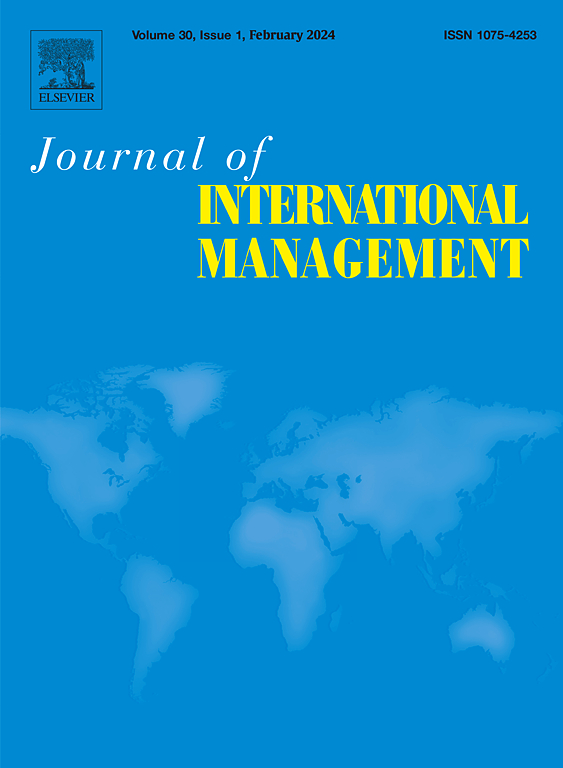社会政治风险研究中的新兴方法论:导论
IF 4.9
2区 管理学
Q1 MANAGEMENT
引用次数: 0
摘要
这篇社论介绍了一个特刊(SI),旨在通过方法创新推进社会政治风险(SPR)及其对国际商业(IB)的影响的研究。为了将这一SI的贡献置于背景下,并阐明SPR研究如何随着时间的推移而演变,我们首先研究了该领域最近的方法趋势。我们对2019年至2023年间发表在顶级管理期刊上的829篇与SPR相关的论文进行了文献计量分析,以确定SPR奖学金中方法使用的最新变化。这一分析表明,SPR研究有一定的方法多样性,主要依赖于回归分析,其次是案例研究、文本分析和离散选择建模。某些方法比其他方法更频繁地用于研究特定类型的SPRs。我们的研究结果还揭示了对SPR的总体度量的不满,导致更多地使用内容分析来提高对SPR多维度的理解。为了解决其中的一些差距,并将SPR奖学金提升到下一个方法论水平,我们为本SI选择了七篇开创性的论文。两篇SI论文解释了使用定性比较分析(QCA)来研究SPR的多面性和主观性。SI引入了两个新的数据集:一个是关于游说的,用于分析外国公司在美国的企业政治活动,另一个是关于夜灯数据,用于分析战略资源。SI的论文中提出的三个创新措施对于衡量特定的战略资源方面特别有用,如民族主义政治言论、基层社会政治情绪和跨国信息距离。这些贡献旨在通过强调在研究特别方案资源时需要方法论多元化和跨学科方法,扩大我们在国际管理领域对特别方案资源的理解。本文章由计算机程序翻译,如有差异,请以英文原文为准。
Emerging methodologies in socio-political risk research: An introduction
This editorial introduces a special issue (SI) aimed at advancing research on socio-political risk (SPR) and its impact on international business (IB) through methodological innovations. To contextualize the contributions of this SI and shed light on how SPR research has evolved over time, we first examine recent methodological trends in the field. We conducted bibliometric analysis of 829 SPR-related papers published in top management journals between 2019 and 2023 to identify recent changes in the use of methodologies in SPR scholarship. This analysis demonstrates that SPR research had some methodological diversity, relying predominantly on regression analysis, followed by case studies, textual analysis, and discrete choice modeling. Certain methods were used more frequently than others for studying specific types of SPRs. Our findings also revealed dissatisfaction with aggregate measures of SPRs, leading to increased use of content analysis for improving the understanding of SPR's multidimensionality. To address some of these gaps and to take SPR scholarship to the next methodological level, we selected seven pioneering papers for this SI. Two SI papers explain the use of Qualitative Comparative Analysis (QCA) for studying the multifaceted nature and subjectivity of SPR. The SI introduces two novel datasets: one on lobbying for the analyzing corporate political activities of foreign firms in the US and another on nightlights data for SPR analysis. Three innovative measures offered in the SI's papers are especially useful for measuring specific SPR aspects such as nationalistic political rhetoric, grassroots socio-political sentiments, and cross-national information distance. These contributions aim to extend our understanding of SPRs within international management domain by emphasizing the need for methodological pluralism and interdisciplinary approaches when studying SPR.
求助全文
通过发布文献求助,成功后即可免费获取论文全文。
去求助
来源期刊

Journal of International Management
MANAGEMENT-
自引率
9.80%
发文量
67
审稿时长
81 days
期刊介绍:
The Journal of International Management is devoted to advancing an understanding of issues in the management of global enterprises, global management theory, and practice; and providing theoretical and managerial implications useful for the further development of research. It is designed to serve an audience of academic researchers and educators, as well as business professionals, by publishing both theoretical and empirical research relating to international management and strategy issues. JIM publishes theoretical and empirical research addressing international business strategy, comparative and cross-cultural management, risk management, organizational behavior, and human resource management, among others.
 求助内容:
求助内容: 应助结果提醒方式:
应助结果提醒方式:


